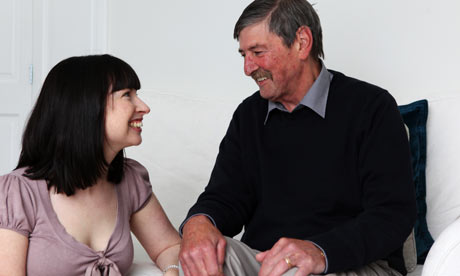
At my wedding earlier this year, my father gave me away. Our progress up the aisle was shaky – he walks with a stick – but we made it. It was an important, but achievable goal; giving a speech was not.
Since his stroke eight years ago aged 55, my father, Keith Howells – ex-policeman, confident public speaker, and last man standing at a party – has suffered from aphasia. A communication disorder, it occurs when the parts of the brain that process language are damaged. It affects 250,000 people a year in the UK and can be caused by head injuries or degenerative illness – but the most common cause is a stroke.
For some people, it's a problem producing language; they know what they want to say but can't find the words, or can't put them together. Some struggle with comprehension. For others, such as my father, with "global aphasia", the damage is so extensive that all aspects of language are affected, but the intellect remains intact.
Before his stroke, my father had a degenerative condition that limited his mobility. But, naturally gregarious, he could still chat, joke and argue, read, and watch films and plays. After he retired he worked in a school for children with behavioural difficulties.
Then, one morning in September 2000, my mother heard a thump from upstairs. She found my father on the bedroom floor, conscious but confused. He'd had a stroke. Thankfully, the physical damage was minimal, but his speech, understanding of speech, reading and writing were all severely impaired.
He seemed bewildered, and although able to say single words, they often didn't make sense. Before I arrived he kept repeating my name, which everyone thought very touching, but it turned out to be a default word used in place of the one he really wanted.
The thought that this social man might never regain his language skills was horrible, but my mother was positive from the start. And we were hopeful – many people recover from aphasia, although doctors warned that significant improvement was unlikely outside the first 12 months.
My father received speech therapy once a week. However my mother's work as an Ofsted inspector took her away from home – and as they didn't qualify for carer's allowance, my father had to go too, so appointments were missed. After several months therapy was discontinued: the magic first year passed and my father was still a foreigner in his own life.
A 2003 study found that more than eight hours of speech therapy a week, for at least 11 weeks, is needed for treatment to be effective, yet the NHS typically provides less than three hours – sometimes just an hour a week for six weeks. There's also evidence that people with aphasia actually can and do make progress after a year – Jenny Dautlich, co-founder of the website Aphasia Now, says it was three years before she began speaking in sentences.
My father has benefited from a supportive family, loyal friends and a stubborn personality. He battles to communicate using gestures, drawings and convoluted verbal guessing-games. He'll often use an associated word to convey an idea; so "America" becomes "where cousin", because we have a cousin who lives in America. If he can't say a word, he might try writing it down. A quirk of aphasia is that the part of the brain that deals with "pre-programmed" language such as swearwords is often unaffected.
One of dad's greatest frustrations is people saying they understand him when they don't, or not taking the time to make themselves understood. It takes patience to communicate with someone who's globally aphasic – you need to talk slowly, repeat yourself, perhaps mime or draw your meaning – but the Eureka moment when you finally make the connection can be great.
Aphasia affects more people than Parkinson's, yet few know what the word means, let alone how the disability presents itself. Shopkeepers, waiters and passersby commonly talk down to my father, shy away or tut in disapproval. For an intelligent man, this is hard to take.
Professor Chris Code, an aphasiologist and neuropsychologist at Exeter University, believes lack of awareness – and media coverage – is partly responsible for the serious shortage of funding available for aphasia services and research. And pharmaceutical companies tend to be more interested in disorders that are amenable to drugs, although this is gradually changing.
Since his stroke, dad's linguistic ability has improved only marginally, but his other communication skills have never been better. And now my mother has signed them both up for a course in Makaton, a communication system based on gesture and graphic symbols. My father is living proof that even if you can't speak, you can still be heard – if only people take the time to listen.
Talking points
• Speak slowly but not as if you're talking to a child. And don't shout.
• Exaggerate stress, intonation, expression and gestures – and pause regularly.
• Use clear, simple words and short, active sentences.
• If you don't understand, say so.
• Ask questions that allow two options only. • Above all, be patient.

